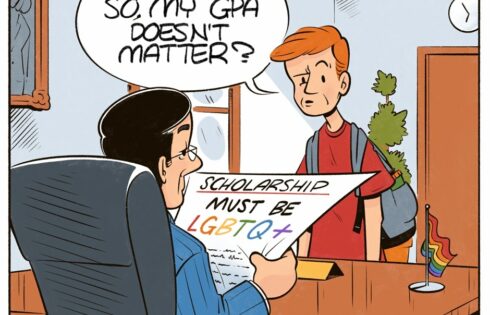
Frank Bruni’s piece in Saturday’s New York Times is a must-read for students and parents who are contemplating those now-fashionable (and sometimes mandatory) “service hours” to pad the college résumés.
The main point is that many students — “skewing towards the affluent,” as a letter writer to Bruni puts it — plan short-lived trips to some Third World locale to help build roads, homes, churches or whatever, and then slap the experience on their university applications.
Or, include it in an essay about “how transformed they are.”
“An awfully large percentage of my friends […] are taking ‘mission trips’ to Central America and Africa,” high school student Dylan Hernandez wrote to Bruni.
“He knows this,” Bruni writes, “from pictures they post on Snapchat and Instagram, typically showing one of them ‘with some poor brown child aged 2 to 6 on their knee[.]’ The captions tend to say something along the lines of, ‘This cutie made it so hard to leave.’”
“It rubs me the wrong way,” Hernandez says, noting that these students don’t seem to be aware of poverty “until an exotic trip comes with it.”
Hernandez reached out to me because he was familiar with writing I had done about the college admissions process. What he described is something that has long bothered me and other critics of that process: the persistent vogue among secondary-school students for so-called service that’s sometimes about little more than a faraway adventure and a few lines or paragraphs on their applications to selective colleges.
It turns developing-world hardship into a prose-ready opportunity for growth, empathy into an extracurricular activity.
MORE: Lie on your kid’s college app and you could be charged with a felony
And it reflects a broader gaming of the admissions process that concerns me just as much, because of its potential to create strange habits and values in the students who go through it, telling them that success is a matter of superficial packaging and checking off the right boxes at the right time. That’s true only in some cases, and hardly the recipe for a life well lived.
In the case of drive-by charity work, the checked box can actually be counterproductive, because application readers see right through it.
“The running joke in admissions is the mission trip to Costa Rica to save the rain forest,” Ángel Pérez, who is in charge of admissions at Trinity College in Hartford, told me.
Bruni also notes a Harvard lecturer who “recalled speaking with wealthy parents who had bought an orphanage in Botswana so their children could have a project to write and talk about.”
That is insane.
As one who spent an entire semester (three and a half months) in a developing country during his undergrad years (and not for any service requirements — they didn’t exist back then), I can tell you that a mere week or two will not give one sufficient cognizance of a nation’s culture, economics, politics, and most importantly, people. “Superficial” is a term that comes to mind.
Service hours are now requirements at many high schools, including being part of the National Honor Society application. In the past, the NHS’s only requisite was a certain (high) GPA.
When my daughter applied for the NHS in high school and was rejected, she was a bit perplexed as to why a 3.9 + change GPA wasn’t enough to get in. She knew service was part of the application and included her volunteer hours at a local dance/ballet studio assisting pre-kindergarten kids.
What she didn’t know was that the four sections of the application are equally weighted. Academics are worth only 25% of the total. Her service section was deemed “too weak.” To her credit, the daughter didn’t care much, saying her record would speak for itself when it came to colleges.
As Bruni points out, students — “whose schedules — jammed with sports, arts, SAT prep and more” — have little time left in the day for service mandates. Besides the usual time studying, the daughter played sports in the fall and spring seasons, participated in dance, and — gasp! — worked part-time.
MORE: Calif. students now given six ‘gender identity’ choices on college app
MORE: Student claims college rejected app due to Christian faith
Like The College Fix on Facebook / Follow us on Twitter
IMAGE: Christopher Hamilton/Flickr






Please join the conversation about our stories on Facebook, Twitter, Instagram, Reddit, MeWe, Rumble, Gab, Minds and Gettr.